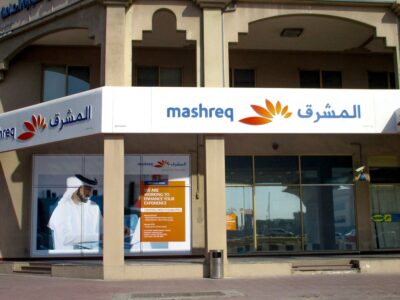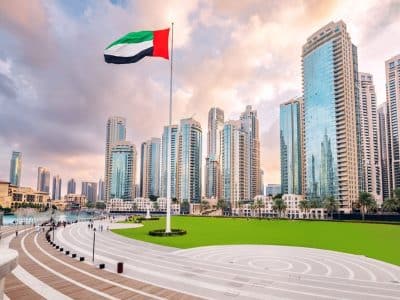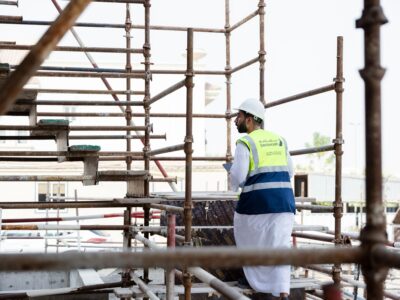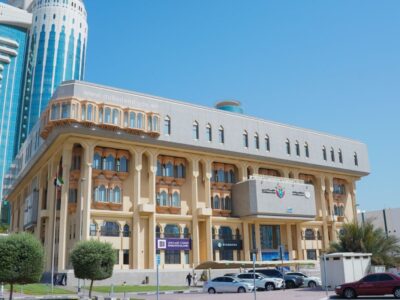There are rare moments in our conversation when Ayman Hariri refers to his late father.
“He was my mentor, my hero, but most importantly, he was my dad.”
Twelve years after the assassination of former Lebanese prime minister Rafik Hariri, the wound is still fresh for his second youngest son, who was 26 at the time.
But he is not alone in his grief.
The death of the man known as “Mr Lebanon” dealt a blow to the hopes of many Lebanese for better times amid ongoing war and sectarian conflict.
Viewed as a mediator between regional powers such as Saudi Arabia and Syria, the well-connected businessman-turned-politician was a symbol of unity credited with the reconstruction of Lebanon following a 15-year civil war. His death drew thousands of mourners onto Beirut’s streets.
Today the lessons he passed down remain very much alive for the son who followed in his footsteps. Truth, humility and doing good things for others are just a few of his father’s traits that he lives by.
Now 38, Ayman takes up his father’s place at the helm of the family’s construction and telecom giant Saudi Oger. While he has him to thank for the former, it is his mother he credits for his latest independent venture far from bricks and mortar, social media app Vero.

Ayman’s late father Rafik Hariri.
“It was my mother who, having seen how much time I was spending on computers, encouraged me to pursue my computer science degree. At that time, that was quite a unique move since most, including my father, expected me to get a business degree. I’m forever grateful to her,” he says.
“Prior to my father’s passing, I started to get a wider understanding of the family business. But I was never involved in the management because I always wanted to seek out my own experiences and not rely entirely on my family business.”
Setting out to do what many have failed to, Hariri co-founded Vero with his cousin, film producer Motaz Nabulsi, and childhood friend, investor Scott Birnbaum, with a promise to take on advertising-driven Facebook, Twitter and Instagram by instead creating a subscription model that allows users to have more control over the whereabouts of their personal data and who can access it.
“We felt that the free business models of Facebook, Twitter and Instagram carry significant hidden costs in the form of unsolicited advertising and data mining, and that these costs were not fully understood by a lot of users, who aren’t always aware of how much data about themselves they are actually giving up when using existing free social media platforms. That’s why we’ve chosen a subscription model for Vero… With Vero there are no ads and no data mining,” he says.
“We don’t answer to advertisers or Wall Street.”
As if to verify Hariri’s concerns, Facebook-owned messaging app WhatsApp announced last year it would share user data with its parent company for ad-targeting purposes.
Vero, which is Latin for “truth”, will provide its first 1 million users with a free subscription for life. Subsequent users will pay an annual fee that Hariri says will be equivalent to the price of one cup of coffee.
Though it takes a brave man to go neck to neck with today’s social giants, Hariri seems more than up for the challenge, he says. He is first tapping into the GCC’s largest market, Saudi Arabia, which is also where his family has done business for decades.
“Saudi Arabia is known to have a huge love of social apps. The great benefit of Vero in this area is the ability to choose who to share a post with through our intuitive loop selector. For instance, private photos can be shared with just your closest friends and no one else will get to see them, while a more public post can be shared with everyone — something that really appeals to our users in the Middle East,” he says.

The political and economic ramifications of Rafik Hariri’s assasination and what it represented have continued for more than a decade.
Growing data use in the kingdom is fuelled by the country’s conservative lifestyle, acting as a means for free speech and communication between millennials that is otherwise looked down upon by some conservative groups. Thanks to apps such as WhatsApp and Skype, internet penetration among nationals is believed to have been approximately 93 percent in early 2016, according to Northwestern University in Qatar.
But can the young Hariri become the Middle East’s Mark Zuckerberg? Considering his app has not yet reached its first 1 million subscribers since its launch in July 2015, the challenge remains.
However, a $1m deal processed on Vero’s ‘buy now’ feature in October 2016 suggests there is potential. The transaction made a 1964 vintage Aston Martin DB5 the first ever classic car to sell on a social media app, in partnership with international car auctioneers Coys. Bought by a private collector in the Middle East through Vero, it marked the largest known transaction made via Apple Pay mobile payment and digital wallet service.
Vero’s ‘buy now’ feature also allows the much-hyped ‘social influencer’ community to give followers direct links to purchase items that they refer to in their posts. That is likely to become a valuable social media function, with data firm Nielsen finding 92 percent of people trust recommendations from individuals more than brands.

The Hariri family’s business Saudi Oger has constructed many of Saudi Arabia’s most significant developments.
Yet despite what may seem to be a promising career in technology, Hariri has not turned his back on the family’s once cash-pumping backbone: Riyadh-based construction firm Saudi Oger. Alongside his older brother Saad Hariri, Ayman acts as deputy chief executive and chairman.
Set up by his father in 1978, Saudi Oger started as a Riyadh-based construction company but quickly grew to cover areas such as real estate and telecommunications. Competing with the Saudi Binladin Group, Oger was behind much of Saudi Arabia’s infrastructure and development projects thanks to Rafik’s close relationship with the Saudi royal family. It built everything from defence installations to schools and hospitals at a time when the kingdom was enjoying newfound wealth and attempting to develop.
Then the unexpected happened. Oil prices crashed in mid-2014, causing a debilitating cut to Saudi government coffers and forcing a sudden freeze on some public spending, including projects already commissioned. According to some reports, Saudi Oger teetered on the brink of bankruptcy in mid-2016 and it was forced to consider a multi-billion-dollar debt restructuring to stave off collapse.

To the shock of many in the business world, another unexpected occurrence took place. Despite owing Oger about $8bn, the Saudi government ended talks aimed at saving its once-celebrated construction giant. Where did this leave Oger? Struggling, to say the least. According to Reuters, the company has $4bn of loans, billions more owed to contractors and suppliers and over $600m owed to workers and severance pay.
But when the going gets tough, the tough get going, and Hariri’s Oger remains standing. To help ease cashflow problems, the firm sold its 20 percent share in one of the Middle East’s oldest and largest financial institutions, Jordan-based Arab Bank. The $1.1bn deal was finalised this month with a group of 40 Arab investors, of whom 70 percent are reportedly Jordanian.
The young Hariri skirts questions about the group’s current financial state and its operations. He argues his focus is on Vero, while also insisting his role in construction is not yet over.

Ayman Hariri has been estimated to be worth more than $1bn but he declines to verify his wealth.
“Starting a social platform is a sizeable undertaking, so that’s my priority right now. But I will continue to make investments in bricks and mortar companies whenever there’s a viable opportunity,” he says.
“What I’m doing at Vero is what I’ve always wanted to do.”
Despite his father’s political acclaim and elder brother Saad’s successful two terms as prime minister, Hariri is uninterested in pursuing that path.
“My passion has always been in business and building companies,” says Hariri, who lives life largely away from the headlines.
“I’m very proud of my brother’s successful political achievements and I can’t think of anyone better suited to take on that challenge and continue my father’s vision.”

Saad Hariri was reappointed prime minister of Lebanon in November.
There is another, less-publicised ambition of his father that Ayman is following, though.
“My father was also known for his philanthropic work. He provided tens of thousands access to a higher education in order for a generation not to be lost to the civil war. I pray that I may continue in his footsteps and leave as positive an impact as he did,” he says.
To many Lebanese, Rafik was known for something bigger still: reconstructing much of Lebanon following its violent 15-year civil war. The late self-made billionaire was especially credited with using his personal wealth to revive the Beirut Central District.
Twelve years after the truck bomb blast that killed him on February 14, 2005, a UN-backed Special Tribunal for Lebanon at The Hague in the Netherlands continues to investigate the assassination.

Facebook and YouTube are the only social media sites with 1 billion users.
Hariri hopes that despite time, justice will be served.
“These assassinations mustn’t go unpunished. The fact that the international community decided to form a special tribunal for my father and his supporters means so much both for his family, who lost a husband, a brother and a father, but also for the Lebanese people, who lost a leader,” he says.
The soft-spoken Hariri may never find out the truth behind his father’s murder, which is likely to haunt him for years to come. But at the very least, he can rest assured he did his best to live up to the expectations of Rafik Hariri — his mentor, his hero, and most importantly, his dad.









